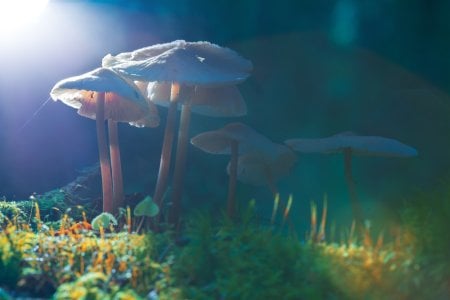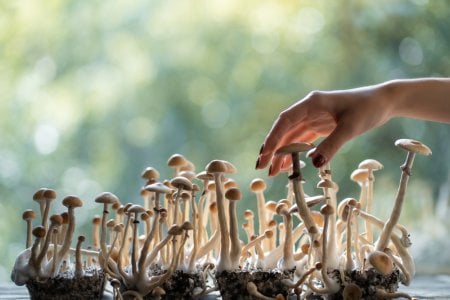Woman passes away after consuming mushroom drink at health retreat
By
Seia Ibanez
- Replies 3
Mushrooms have long been celebrated for their nutritional value and role in traditional medicine.
However, a recent incident underscores the potential dangers of consuming some mushrooms, which can range from highly beneficial to fatally toxic.
According to the operator of the wellness venue, Rachael Dixon, from Ringwood North, tragically died following the consumption of a mushroom-infused drink during a private event.
It was believed that she went into cardiac arrest and passed away at the scene, while two other attendees were taken to hospital for observation.
This incident has renewed experts' emphasis on the importance of caution when handling mushroom products and medicines.
One type of mushroom that has garnered attention is the psilocybin mushroom, commonly known as ‘magic mushrooms’.
An active compound in these mushrooms, psilocybin has been the subject of scientific research for its potential to treat severe mental health conditions.
In a decision last year, Australian drug regulators approved psilocybin as a medicine for treatment-resistant depression.
Professor Suresh Sundram of Monash University, who has been involved in clinical trials and now runs a private clinic offering psychedelic therapies, has noted an increased interest in psilocybin treatments.
However, he cautions that outside of a clinical setting, psilocybin remains prohibited and poses risks, including the danger of consuming a different, potentially harmful mushroom by mistake.
Despite this, he asserted that psilocybin itself is unlikely to cause sudden death due to its low toxicity.
‘Psilocybin has a very low toxicity, it can cause adverse events, which are restricted to the time that the person is under the influence of the agent,’ he said, adding that it was due to contaminants that caused her sudden death.
Dr Jonathon Karro, Director of Emergency Medicine at St Vincent's Hospital Melbourne, echoed this sentiment, explaining that while psilocybin can lead to psychiatric symptoms such as hallucinations and paranoia, it rarely causes death.
‘The substances contained in a magic mushroom almost never cause death,’ he said.
‘The deaths that we see from hallucinogen or psychedelic mushrooms are often from trauma, the person might put themselves in a risky situation, fall off a building, be involved in a car accident.’
An example is the case of an off-duty pilot who allegedly attempted to disable the plane’s engine while under the influence of ‘magic mushrooms’.
The pilot detailed he was dreaming and assumed that pulling the fire extinguishing system’s handles would ‘wake him up’ from his dream-like state.
The growing interest in the medicinal use of mushrooms has not gone unnoticed by the industry.
John Ford, a mushroom farmer from Unearthed Co in the Yarra Valley, has observed a surge in demand for mushroom powders, such as Lion's mane, which is touted for its cognitive health benefits.
‘Probably since COVID times, I think people were really looking for something, something a little bit different, but also something that's natural, that can bolster their health and immune system, things like that,’ he said.
While some studies have shown minor improvements in cognitive function and mood, more research is needed to fully understand the effects of these products.
The surge in mushroom foraging was linked to a tragic incident in Leongatha, Victoria, where three individuals lost their lives after consuming a Beef Wellington that allegedly contained death cap mushrooms.

The Therapeutic Goods Administration (TGA) has responded to the rising popularity of medicinal mushrooms by issuing guidance and requiring approval for products making therapeutic claims.
Despite the potential benefits of medicinal mushrooms, the recent death serves as a stark reminder of the risks involved in foraging and consuming wild mushrooms.
Dr Karro advised against foraging due to the difficulty distinguishing between safe and deadly varieties.
‘I always discourage anyone from foraging for mushrooms because you really don't know,’ he said.
‘There may be some that are edible or used for other purposes intermixed with others that are deadly. One death cap mushroom can result in the death of an adult.’
Cameron Russell, who leads mushroom foraging tours on the Mornington Peninsula, stresses the importance of expertise in identifying mushrooms.
‘There are tens of thousands of species of fungus, some of them are fatal, and some of them do a lot of damage,’ he said.
‘It's a case of understanding what you're looking at, which is not an easy thing.’
The Australian Mushroom Growers Association recommended that the safest way to consume mushrooms is to purchase them from a supermarket, greengrocer, or farmer's market.
‘Commercially grown mushrooms, produced in Australia, are safe and high quality,’ it said in a statement.
‘Do not pick or eat mushrooms growing in the wild…it isn't worth the risk.’
Family and friends have paid tribute to Dixon here:
Source: 9 News Australia/YouTube
In case of emergencies, immediately call 000 or the Poisons Information Centre at 131 126.
 We at the Seniors Discount Club would like to express our deepest sympathies to the family of Rachael Dixon. May she rest in peace.
We at the Seniors Discount Club would like to express our deepest sympathies to the family of Rachael Dixon. May she rest in peace.
What are your thoughts on this news, members? Have you ever tried mushroom picking? Or are you concerned by the high level of risk involved? Let us know in the comments below.
However, a recent incident underscores the potential dangers of consuming some mushrooms, which can range from highly beneficial to fatally toxic.
According to the operator of the wellness venue, Rachael Dixon, from Ringwood North, tragically died following the consumption of a mushroom-infused drink during a private event.
It was believed that she went into cardiac arrest and passed away at the scene, while two other attendees were taken to hospital for observation.
This incident has renewed experts' emphasis on the importance of caution when handling mushroom products and medicines.
One type of mushroom that has garnered attention is the psilocybin mushroom, commonly known as ‘magic mushrooms’.
An active compound in these mushrooms, psilocybin has been the subject of scientific research for its potential to treat severe mental health conditions.
In a decision last year, Australian drug regulators approved psilocybin as a medicine for treatment-resistant depression.
Professor Suresh Sundram of Monash University, who has been involved in clinical trials and now runs a private clinic offering psychedelic therapies, has noted an increased interest in psilocybin treatments.
However, he cautions that outside of a clinical setting, psilocybin remains prohibited and poses risks, including the danger of consuming a different, potentially harmful mushroom by mistake.
Despite this, he asserted that psilocybin itself is unlikely to cause sudden death due to its low toxicity.
‘Psilocybin has a very low toxicity, it can cause adverse events, which are restricted to the time that the person is under the influence of the agent,’ he said, adding that it was due to contaminants that caused her sudden death.
Dr Jonathon Karro, Director of Emergency Medicine at St Vincent's Hospital Melbourne, echoed this sentiment, explaining that while psilocybin can lead to psychiatric symptoms such as hallucinations and paranoia, it rarely causes death.
‘The substances contained in a magic mushroom almost never cause death,’ he said.
‘The deaths that we see from hallucinogen or psychedelic mushrooms are often from trauma, the person might put themselves in a risky situation, fall off a building, be involved in a car accident.’
An example is the case of an off-duty pilot who allegedly attempted to disable the plane’s engine while under the influence of ‘magic mushrooms’.
The pilot detailed he was dreaming and assumed that pulling the fire extinguishing system’s handles would ‘wake him up’ from his dream-like state.
The growing interest in the medicinal use of mushrooms has not gone unnoticed by the industry.
John Ford, a mushroom farmer from Unearthed Co in the Yarra Valley, has observed a surge in demand for mushroom powders, such as Lion's mane, which is touted for its cognitive health benefits.
‘Probably since COVID times, I think people were really looking for something, something a little bit different, but also something that's natural, that can bolster their health and immune system, things like that,’ he said.
While some studies have shown minor improvements in cognitive function and mood, more research is needed to fully understand the effects of these products.
The surge in mushroom foraging was linked to a tragic incident in Leongatha, Victoria, where three individuals lost their lives after consuming a Beef Wellington that allegedly contained death cap mushrooms.

There has been a surge in mushroom foraging as they claimed to have health benefits. Credit: Shutterstock
The Therapeutic Goods Administration (TGA) has responded to the rising popularity of medicinal mushrooms by issuing guidance and requiring approval for products making therapeutic claims.
Despite the potential benefits of medicinal mushrooms, the recent death serves as a stark reminder of the risks involved in foraging and consuming wild mushrooms.
Dr Karro advised against foraging due to the difficulty distinguishing between safe and deadly varieties.
‘I always discourage anyone from foraging for mushrooms because you really don't know,’ he said.
‘There may be some that are edible or used for other purposes intermixed with others that are deadly. One death cap mushroom can result in the death of an adult.’
Cameron Russell, who leads mushroom foraging tours on the Mornington Peninsula, stresses the importance of expertise in identifying mushrooms.
‘There are tens of thousands of species of fungus, some of them are fatal, and some of them do a lot of damage,’ he said.
‘It's a case of understanding what you're looking at, which is not an easy thing.’
The Australian Mushroom Growers Association recommended that the safest way to consume mushrooms is to purchase them from a supermarket, greengrocer, or farmer's market.
‘Commercially grown mushrooms, produced in Australia, are safe and high quality,’ it said in a statement.
‘Do not pick or eat mushrooms growing in the wild…it isn't worth the risk.’
Family and friends have paid tribute to Dixon here:
Source: 9 News Australia/YouTube
In case of emergencies, immediately call 000 or the Poisons Information Centre at 131 126.
Key Takeaways
- A Melbourne woman's death at a health retreat has raised concerns about the safety of foraging for mushrooms and using them in wellness products.
- Experts warn that while some mushrooms are safe and used in traditional medicines, others can be toxic, and foraging carries significant risks.
- Psilocybin, found in 'magic' mushrooms, has been approved for treatment-resistant depression but remains illegal outside clinical settings, and its misidentification with toxic species can be dangerous.
- Regulation of medicinal mushroom products is increasing, with the Therapeutic Goods Administration issuing guidance and requiring approvals for products with therapeutic claims.
What are your thoughts on this news, members? Have you ever tried mushroom picking? Or are you concerned by the high level of risk involved? Let us know in the comments below.








